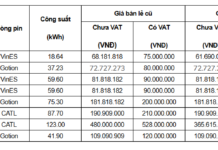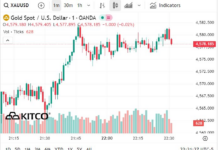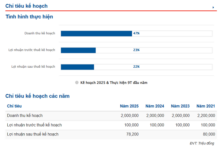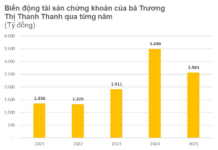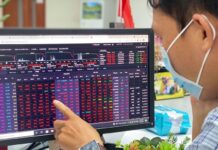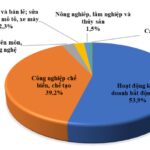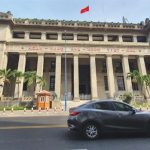At a regular press conference of the Government held in the afternoon of July 6, 2024, Minister and Chairman of the Government Office Tran Van Son, Spokesperson of the Government, said that in the first six months of the year, the economy had generally recovered to pre-Covid-19 levels and continued its positive trend, with each month and quarter performing better than the last. Overall, the six-month period achieved significant results, with most sectors outperforming the same period last year.
11 NOTABLE ACHIEVEMENTS
According to the report, GDP growth in the second quarter rebounded strongly, reaching 6.93%. For the first six months, GDP growth was recorded at 6.42%, significantly higher than the same period in 2023 (3.84%) and surpassing the scenario outlined in Resolution 01 (5.5-6%). All three sectors of agriculture, industry, and services recorded robust growth (Agriculture grew by 3.38%; industry and construction by 7.51%; and services by 6.64%).
Macroeconomic stability was maintained, with inflation under control and key balances ensured. The consumer price index (CPI) for the first six months increased by 4.08% (while core inflation rose by 2.75%). Energy security and food security were guaranteed (Rice exports reached over 4.6 million tons, with a turnover of nearly $3 billion, up 10.4% and 32%, respectively, compared to the same period last year). Labor supply and demand were also largely balanced.

Notably, exports continued to surge, resulting in a substantial trade surplus, which contributed to a positive balance of payments. Overall, exports grew by 14.5% in the first six months, while imports increased by 17%, resulting in a trade surplus of $11.63 billion.
The services and tourism sectors witnessed a strong recovery. Total retail sales of goods and services consumption increased by 8.6% during this period. International visitor arrivals for the first six months reached over 8.8 million, up 58.4% compared to the same period in 2023 and up 4.1% compared to the pre-Covid-19 period in 2019.
The state budget situation continued to improve significantly. Total state budget revenue in the first six months reached 60% of the annual estimate, up 15.7% compared to the same period last year. Public debt, government debt, foreign debt, and budget deficit were well controlled and remained below the set limits.
Investment continued to yield positive results, providing a driving force for economic growth. Total social investment capital in the second quarter increased by 7.5%, and for the first six months, it grew by 6.8% (including a 4.8% increase in state investment capital, a 6.7% increase in non-state investment capital, and a 10.3% increase in FDI capital). Disbursement of public investment capital reached 29.39% of the plan.
FDI attraction in the first six months reached $15.19 billion, up 13.1%, while realized FDI capital reached $10.84 billion, up 8.2% (the highest in the last five years). Business development continued its upward trend, with 80,500 newly established enterprises, up 6.1%, and 39,100 operational enterprises, up 3.9%, compared to the same period last year.
Culture, social affairs, and social security were given due attention, with improvements in people’s lives. In the second quarter, 95.1% of households reported stable or higher incomes compared to the previous year. Average labor income for the first six months reached 7.5 million VND per month, up 7.4% year-on-year. So far this year, 21,300 tons of rice have been provided for hunger relief, and over 26.2 million free health insurance cards have been issued. Cultural, festival, and sports activities were organized in a joyful, safe, and healthy manner.
Administrative reforms were prioritized, especially in streamlining and simplifying administrative procedures, while anti-corruption efforts were strengthened.
Political and social stability was maintained, with enhanced national defense and security, and active foreign affairs and international integration. Several successful diplomatic activities were organized for the country’s leaders, and economic diplomacy was promoted, further elevating the country’s reputation and position internationally.
Efforts to increase revenue, save expenses, and restructure public investment were effectively implemented, resulting in approximately VND 700 trillion to realize the salary reform plan, which has received widespread support from the public and salary earners.
At the press conference, Minister Tran Van Son shared that many international organizations and experts continued to highly assess Vietnam’s economic performance and prospects. ADB, Standard Chartered, and HSBC forecast Vietnam’s GDP growth for 2024 to be around 6%. IMF ranked Vietnam as the only Southeast Asian representative in the top 10, with a projected growth rate of 6.4% for the 2024-2029 period. Vietnam also improved its rankings in the business environment index by 12 places and in the Global Innovation Index by 2 places.
STRIVING TOWARDS THE GROWTH TARGETS FOR 2024
While acknowledging the significant achievements, the Government also recognized the existing shortcomings, challenges, and difficulties that need to be addressed. Specifically, the pressure on governance remains high, especially in controlling inflation, exchange rates, and maintaining macroeconomic stability due to external influences. Economic growth in some localities remains low, and some sectors face difficulties in production and business activities. The disbursement rate of public investment capital in the first six months was lower than the same period last year. While the real estate market has initially stabilized, there are still slow resolutions to existing difficulties and challenges. Some ministries and agencies have failed to meet deadlines for submitting draft laws, and there are delays in issuing guiding documents for laws that have taken effect. A portion of the population continues to face livelihood challenges.
Based on the analysis and forecast of the international, regional, and domestic situations, the Government is determined to overcome limitations, shortcomings, and difficulties, and strive to successfully achieve the set targets, goals, and tasks for 2024. This will create a positive momentum for development in 2025 and the successful realization of the goals set by the 13th Party Congress.
The Government aims for a growth rate of around 6.5-7% in the third quarter and a higher rate in the fourth quarter of 2024. It will maintain macroeconomic stability, keep inflation below 4.5%, ensure key economic balances with a surplus, and guarantee monetary and financial security. National defense and security will be strengthened, along with political stability and social order, while actively promoting foreign affairs and international integration.
Regarding key tasks and solutions, the Government will continue to prioritize promoting growth in conjunction with maintaining macroeconomic stability, curbing inflation, and ensuring the major balances of the economy. Fiscal policy will be implemented expansively, reasonably, and with a focus on key areas, in coordination with a proactive, flexible, timely, and effective monetary policy. Financial and budgetary discipline will be tightened, with enhanced revenue management and budget expenditure savings.
The Government will also promote digital transformation and the use of e-invoices to prevent tax losses. It will continue to implement policies on tax exemption, reduction, and extension of payment deadlines, as well as review challenges and promote the efficiency of the real estate, corporate bond, and securities markets. Sufficient electricity and fuel supply for production and consumption will be ensured, with a firm commitment to preventing shortages of electricity, fuel, and food.
More aggressive measures will be taken to accelerate the disbursement of public investment capital and the three National Target Programs. The activities of the five Working Groups of the Prime Minister and the 26 Working Groups of the Government members will be further promoted. The progress of key infrastructure projects will be expedited, and a competition program will be organized to complete expressway projects, aiming for the 80th anniversary of the country’s establishment and the 50th anniversary of the liberation of the South.
The Government will concentrate on perfecting institutions and laws and reforming administrative procedures, in tandem with accelerating national digital transformation. It will promptly issue decrees and circulars to ensure their simultaneous entry into force with relevant laws. The Government will also promptly issue plans to implement the approved master plans. Administrative procedures will be cut and simplified, and digital transformation and Proposal 06 will be promoted, along with the construction of a national data center. Additionally, attention will be given to cultural, social, and environmental fields, ensuring social security and improving people’s lives.
Fighting Cross-Ownership: Impossible to “Take Tangibles to Treat Intangibles”
The recent amendment to the Credit Institutions Act, passed by the National Assembly during an extraordinary session, has introduced several measures to address cross-ownership, manipulation, and domination of credit institutions. However, it is challenging to “make the intangible tangible”! To prevent cross-ownership, it is crucial to enhance the effectiveness of inspections and supervision.





